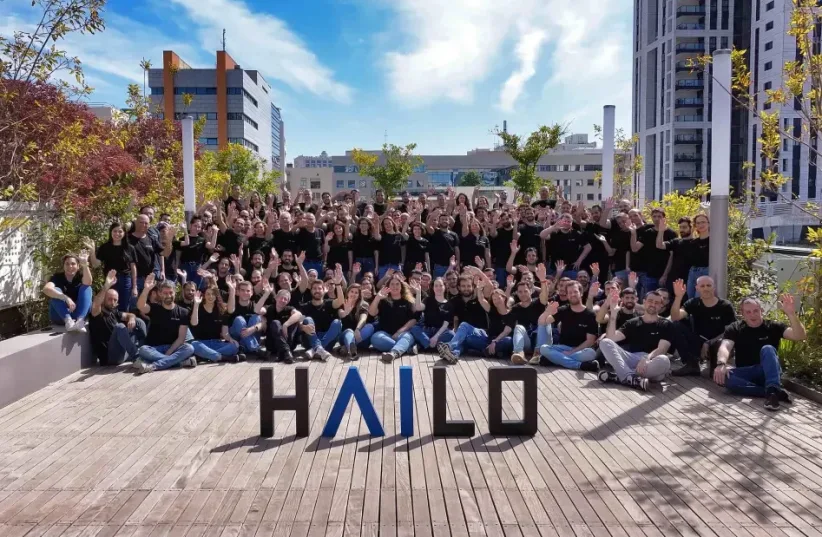The unicorn company Hailo from Tel Aviv, a leading manufacturer of AI processors for end devices, raised 120 million dollars which is added to its third fundraising round (C round).
At the same time, the company launched its high-performance Hailo-10 GenAI accelerators that herald a new era where users can own GenAI (Generative Artificial Intelligence) applications and run them locally on their devices without the need to subscribe to cloud-based AI services creating
The new financing process was led by existing and new investors, among them: the Zisapel family, Gil Agmon, Delek Motors, Alfred Akirov, the investment company DCLBA, Vasuki, OurCrowd, Talcar, Comasco, Automotive Equipment (AEV) and Poaleim Equity. In total, the company has raised more than 340 million dollars since its inception.
"Closing our new funding round allows us to leverage all the exciting opportunities we have in store and paves the way for our long-term growth," said Or Danon, CEO and co-founder of Hailo.
"Together with the launch of our Hailo-10 GenAI accelerator , the move puts us in a strategic position that will allow us to bring classic AI and GenAI to edge devices in ways that will significantly expand the deployment and impact of this important technology. We designed Hailo-10 to continuously integrate creative artificial intelligence capabilities into users' daily lives and free users from the limitations of cloud-based networks. In this way, the users actually become the owners of tools such as chatbots, copilots and other tools for creating content, and can use the tools continuously and immediately, to improve productivity and enrich the user experience," stressed Danon.
Hailo was established in February 2017 by graduates of the Elite Technological Unit of the Intelligence Corps.
The company became a unicorn in 2022 after raising capital of 136 million dollars as part of the C round. Hilo has offices in Japan, Taiwan, China, South Korea, Germany, and the USA and a network of distributors throughout Asia, North America, South America, Australia and Europe and its products serve more from 300 customers worldwide.
The company currently employs over 250 employees in Tel Aviv and abroad, and is recruiting additional employees to support the accelerated growth. The Hilo processors are the product of a rethinking of the usual computing architecture and they allow smart devices to perform sophisticated deep learning tasks such as the identification and segmentation of objects in real time, while minimizing the power consumption, size and cost of the chip. The processors are intended to be integrated into many types of smart machines and smart devices in a variety of sectors, including automotive, security, computing, industry 4.0 and retail.
The new Hailo-10 accelerator empowers edge devices such as personal computers, smart cars and commercial robots with GenAI and thereby enables users to take full ownership of their creative artificial intelligence experiences and make these experiences an integral part of their daily routine. Hailo achieves this immersive GenAI experience through the Hailo-10 architecture that supports maximum performance of the creative artificial intelligence while minimizing power consumption.
Early applications of the Hailo-10 GenAI accelerators will be for personal computers and in-vehicle infotainment systems, powering low-performance CPUs that lack the capability of their own to run the chatbots, copilots, personal assistants, and speech-activated operating systems that have become standard today. Hailo will start selling first units of the Hailo-10 artificial intelligence accelerator in the second quarter of 2024.
"Whether users are running creative artificial intelligence to automate translation or summarizing information in real-time, writing software code, or creating images and videos based on text commands, Hailo-10 allows them to do so directly from their PCs or other systems at the edge of the network, without burdening on the CPU processor or drain the battery," noted Or Danon.
Hailo-10: Creative artificial intelligence in edge devices
The new GenAI accelerator from the Hailo-10 model makes it possible to run a wide range of applications that maintain Hailo's lead both in terms of performance and cost and in terms of performance and power consumption. Hailo-10 leverages the same software suite used by the company's previous AI processors Hailo-8 and Hailo-15 and enables seamless integration of AI applications across different end devices and diverse platforms.
The transition of the creative artificial intelligence processing from the cloud to the end devices ensures continuous access to GenAI services, independent of the network connection, enables processing and receiving results in real time, improves privacy and reduces the carbon footprint by reducing the dependence on significant processing power in cloud-based server farms.
"As creative artificial intelligence becomes a work tool and an integral part of our daily lives, we are required to process large language models (LLMs) using the smallest amount of power possible - in practice, less than 5 watts," continued Or Danon.
For demonstration Hailo-10 can run the popular language model Llama2-7B using TPS 10 (Tokens Per Second) at less than 5 watts. Processing Stable Diffusion 2.1, a popular model for creating images from textual prompts, Hailo-10 allows each image to be produced in less than 5 seconds using the same very low power level.
The Hailo-10 accelerator is capable of achieving up to 40 TOPS (Tera Operations Per Second), a new performance benchmark for AI accelerators. Hailo-10 is faster and more energy efficient compared to integrated NPU (Neural Processing Units) solutions and provides at least twice the performance at half the power compared to the Intel Core Ultra NPU processor, according to recently published performance tests.
